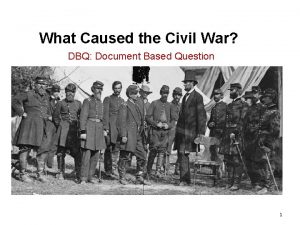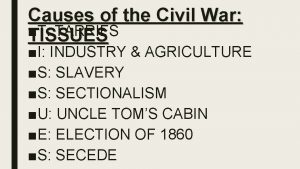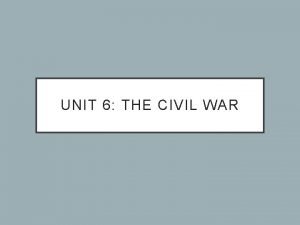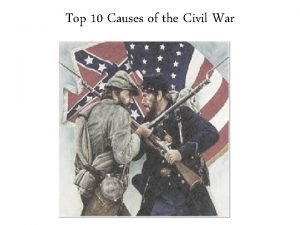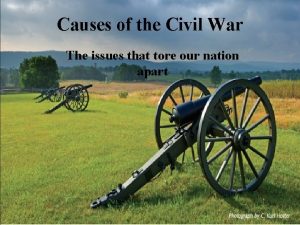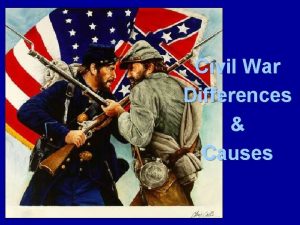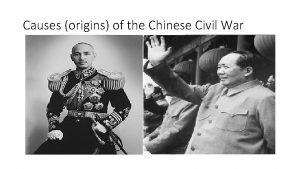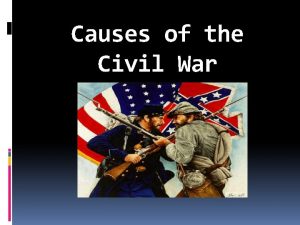Mr Carrs Top 10 causes for the Civil































































- Slides: 63

Mr. Carr’s Top 10 causes for the Civil War • 10) Uncle Tom’s Cabin • 9) Northern writers/newspapers • 8) Kansas-Nebraska Act • 7) Abolitionists • 6) Jamestown v. Mass. Bay Colony • 5) Compromise of 1850 • 4) Fugitive Slave Law/Dredd Scott case • 3) Morality of slavery • 2) Southern economy/way of life • 1) Election of 1860

Border States-slave states that did NOT join the Confederacy; Delaware, Maryland, Missouri, and Kentucky • Richmond became Southern capital. • Important b/c of Ohio and Mississippi Rivers • Family members were divided as to which side to fight for • South formed the Confederate States of America; President Jefferson Davis led; Confederate flag • Stephen Douglas- “every man must be for the United States or against it. ”

Original Strategies for the Civil War • North Strategy –anaconda plan • Capture Richmond • Establish a Naval Blockade • Control the Mississippi River • South Strategy • Cotton Diplomacy • Fight hard and wear down the will of the Union • Take Washington D. C. • Prolong the War; let war come to them

The War in the East

Lincoln visiting Gen. Mc. Dowell

First Battle of Bull Run • Lincoln ordered Mc. Dowell to lead troops to Richmond • Ill-trained soldiers; easily distracted • At first, the Union drove the Con. back • Con. General Thomas Jackson stood his ground • “Stonewall Jackson” • Union retreats back to Washington D. C. • South could have captured Washington but were too tired • Union troops were shocked at the outcome



1 st Battle of Bull Run (Manassas)

The 1 st Battle of Bull Run • “Stonewall” Jackson • “There is Jackson standing like a Stonewall” • People realized that the war would not be easy or short • The south was victorious • General Irvin Mc. Dowell • Failed to produce a victory at the 1 st Battle of Bull Run.

Seven Days’ Battle • Lincoln still wanted Richmond despite losing the First Battle of Bull Run. • Lincoln sent General George Mc. Clellan to Virginia • South: General Lee • Mc. Clellan hesitated to attack b/c he thought he was outnumbered. • This delay gave the Con. time to get more men. Gen. Mc. Clellan Robert E. Lee

Seven Days’ Battle Continued • President Jefferson Davis put General Robert E. Lee in charge of the Con. Army • Lee-graduate from West Point, fought in Mexican-American War, engineer for the Army Corps of Engineers, and helped capture John Brown at Harpers Ferry • Lincoln asked him to command Union forces but he was loyal to the South • He opposed slavery and secession • When Virginia left the Union, Lee resigned from the U. S. Army and returned home to Virginia

Seven Days’ Battle Continued • Lee attacked Mc. Clellan in Richmond • 5 days of battle • Lee forced Mc. Clellan back • Confederates lost 20, 000 men • Union lost 16, 000 men • Union retreated OUT OF RICHMOND


Second Battle of Bull Run • Lincoln ordered General John Pope to attack Richmond • Lee (south) By August 1862, Lee had pushed most of the Union forces out of Virginia *******Lee decides to take the war to the North



Section 2: The War in the East Confederate Victories in Virginia • First Battle of Bull Run – July 1861 • Second Battle of Bull Run – August 1862 Importance of these battles • The Union was pushed out of Virginia. • The Confederacy moved into the North. • It was not the war that was planned

Section 2: The War in the East Battle of Antietam • The Battle of Antietam (Battle of Sharpsburg), on September 17, 1862, stopped the Confederate’s northward advance. • Union troops found a copy of Lee’s battle plan • Union suffered 12, 000 casualties and Confederates suffered 13, 000. It was the bloodiest single day battle in the war. • Mc. Clellan allowed Lee to retreat to Virginia



Burnside’s Bridge

The War in the East Civil War Victories Importance Confederacy • First Battle of Bull Run • Seven Days’ Battles • Second Battle of Bull Run Union • Battle of Antietam • dashed Union’s hopes of a quick and easy win • forced a Union retreat from the area around Richmond • helped drive Union forces out of Virginia • stopped the Confederate’s northward advance

Bellringer: Briefly explain the first Battle of Bull Run, Seven Days Battle, Second Battle of Bull Run, and Antietam • Class Agenda: Agenda • • • Journal Discussion Review Wars in the East Monitor and Virginia Rebuilding Richmond intro

Section 2: The War in the East Significance of the Monitor and the Virginia • The North controlled the sea due to industry • Union cut off trade, etc. hurting the Southern economy • North and South build ironclad-ships heavily armored with iron

War at Sea • Confederacy built the Virginia and the Union built the Monitor • Both ships battle back and forth but didn’t sink • The Virginia retreated • Union success kept the blockade, which in turn continued to hurt the economy of the South

March 9 th 1862 Met off the coast of Virginia

• Important figure in the war out west. • Volunteered to fight for the Union once the war started. • Lincoln said, “I can’t spare this man, he fights. ”

• Union Plan: control the Mississippi River • This would cut the eastern states of the Confederacy off from resources. EX. Food • Union could set up bases along Miss. R. • Could attack communication and transportation network of Confederacy

• April 6, 1862 Confederates attack • Grant ordered troops to hold their ground at any cost. • April 7 -Grant arranged a counterattack • Confederates retreated • Major victory-helped keep control of Miss. R.

• New Orleans-largest city in the South • Union needed to control it to move men and supplies • David Farragut- Union naval leader. • Could not destroy forts guarding New Orleans so he sailed past them. • Eventually the Union gains control of New Orleans and it surrendered April 29, 1863 • Continued up the Miss. R. and took Baton Rouge and Natchez • He wanted to take Vicksburg

• Southern advantage: high cliffs • John Pemberton-southern general • Grant blocked southern forces from aiding Vicksburg • Surrounded it-no supplies could get in • 6 weeks-people starving, etc. • Forced to surrender • Union GAINED total control of Miss. R. on July 4, 1863

• Arkansas, Missouri, Texas coast, New Mexico • Aug. 1861 Confed. forces marched into New Mex. They were defeated by Union troops at Glorieta Pass, near Santa Fe • Union victory ended Confed. hopes of controlling the southwest.

• Northwestern Arkansas • Some American Indians fought for Confederates-hoped for independence • Slavery legal in Confederacy and some Indians had slaves. • Union won despite being outnumbered • Gave Union control Missouri

SECTION 3 The War in the West Strategies • Union holds its ground, despite surprise attack. • Union attacked southern forces at Jackson, obliterating Vicksburg’s reinforcements. • Fought to protect Union forts in the Midwest. Implications Battle of Shiloh Siege of Vicksburg Battle of Pea Ridge • gave Union greater control of the Mississippi River valley. • gave the Union total control of the Mississippi River, cutting off the western states (AK, LA, TX) • gave the Union control over Missouri

A General Problem • Mc. Dowell (Fired after 1 st Bull Run) • Mc. Clellan (Fired after Antietam) • Burnside (Fired after a month) • Hooker (Fired after Chancellorsville) • Meade (Won Gettysburg) • Grant (Lee surrendered to at Appomattox)

Section 4: Life during the War The North’s Reaction to the Emancipation Proclamation • It was praised. • Northern Democrats opposed it because they only wanted to restore the Union, not to end slavery • Abolitionists argued that Lincoln had not gone far enough still leaving “slavery, as a system. . . , still to exist in all the so-called loyal Slave States. ” Border States still had slavery.

• Northerners upset with the length of time the war was taking and increasing number of casualties. • N. Democrats spoke out against the war-called Copperheads. • Copperheads were sympathetic Midwesterners and opposed abolition. They just wanted the war to end.

• Thought they threatened the war effort. • Suspended the right of habeas corpus -the constitutional protection against unlawful imprisonment. • Union officials could jail enemies w/out evidence or trial. (angered Democrats) • March 1863 -draft instituted • Dishonesty in draft • Wealthy could pay their way out • Copperheads-thought unfair to force whites to fight for the freedom of southern slaves.



• Consisted of mostly free slaves • July 1863 -played a key role in the attack on South Carolina’s Fort Wagner

“Abandon all the posts now possessed by black men, surrender all these advantages to the enemy, and we would be compelled [forced] to abandon the war in three weeks. ” -Abraham Lincoln

• Received less pay than white soldiers • Discrimination • Danger-sold into slavery or killed

SECTION 4 Life during the War North Anti-draft riots broke out. Both Some people criticized its inequality: rich people were far less likely to be drafted than poor people. South People took up arms against officials.

You are Lincoln, what would you do? • It is 1863, the North has only won one major battle in the East. Copperheads are beginning to riot and question the war. They are spreading disbelief in the war. Many Copperheads were Midwesterners who sympathized with the South, objected to abolition, and wanted the war to end. Thousands of troops are dying. You are Abraham Lincoln, what would you do? • Create a plan with your table to satisfy the public in the North and to end the riots and spread of false information.

• 96) 5/16/06 What did you learn yesterday about the Emancipation Proclamation? What were some of its long term and short term effects? • Class Agenda • • 54 th Massachusetts Battle of Gettysburg Address General Sherman and fire

Show simulation

Section 5: The Tide of the War Turns Importance of the Battle of Gettysburg • It was a major turning point because General Lee never again entered the North. • This Union victory took place on the same day as General Grant’s capture of Vicksburg in Mississippi. • Both these critical victories made northerners believe that the Confederacy could be defeated.

5/19/06 97) In review, what would you have done differently with your plan to Rebuild Richmond. Would you have interacted with your group differently? What would you have changed? Agenda: -Rebuilding Richmond Revisited -Sherman -Total War Discussion -Study Guide

Section 5: The Tide of the War Turns Campaigns Launched in Virginia and Lower South • Wilderness Campaign – May-June 1864 • Battle of Cold Harbor – June 1 -3, 1864 • Battle in Atlanta – Atlanta fell to General Sherman on September 2, 1864 • Sherman’s March to the Sea – ended December 10, 1864 when Sherman reached Savannah, Georgia • Read pg 604









Discussion • What is total war? • Is it a good thing?

SECTION 5 The Tide of the War Turns The Battle of Gettysburg takes place, ending in Union Victory. July 1– 3, 1863: May–June, 1864: The Wilderness Campaign weakens Lee’s forces in Virginia. Sept. 2, 1864: Atlanta falls to Sherman’s forces. Dec. 10, 1864: Sherman’s army invades Savannah. April 2, 1865: Grant surrounds Lee’s army in Richmond. April 9, 1865: Lee surrenders to Grant.

Section 5: The Tide of the War Turns The End of the Civil War • Trapped and defenseless in Richmond, Virginia, Lee surrendered to Grant at Appomattox Courthouse on April 9, 1865. • The Civil War had come to an end.

98) 5/22/06 Write a creative story about one of these two pictures. What do you think they are thinking about, now that the war is over?
 Carrs lane counselling
Carrs lane counselling Civil rights and civil liberties webquest
Civil rights and civil liberties webquest Causes of the english civil war
Causes of the english civil war Causes of the civil war dbq
Causes of the civil war dbq Tissues causes of civil war
Tissues causes of civil war The cause of the civil war
The cause of the civil war What are the 3 main causes of the civil war
What are the 3 main causes of the civil war Causes of the civil war jeopardy
Causes of the civil war jeopardy Causes of the civil war
Causes of the civil war What were the 4 main causes of the civil war
What were the 4 main causes of the civil war Proximate and ultimate causes of behaviour
Proximate and ultimate causes of behaviour Ultimate and proximate causes of behaviour
Ultimate and proximate causes of behaviour Tobinskatten för och nackdelar
Tobinskatten för och nackdelar En lathund för arbete med kontinuitetshantering
En lathund för arbete med kontinuitetshantering Atmosfr
Atmosfr Mitos steg
Mitos steg Verifikationsplan
Verifikationsplan Rbk mätning
Rbk mätning Lufttryck formel
Lufttryck formel Presentera för publik crossboss
Presentera för publik crossboss Var 1721 för stormaktssverige
Var 1721 för stormaktssverige Förklara densitet för barn
Förklara densitet för barn Elektronik för barn
Elektronik för barn Tack för att ni har lyssnat
Tack för att ni har lyssnat Smärtskolan kunskap för livet
Smärtskolan kunskap för livet Vad är referatmarkeringar
Vad är referatmarkeringar Brunn karttecken
Brunn karttecken Typiska novell drag
Typiska novell drag Fimbrietratt
Fimbrietratt Trög för kemist
Trög för kemist Autokratiskt ledarskap
Autokratiskt ledarskap Multiplikation med uppställning
Multiplikation med uppställning Kassaregister ideell förening
Kassaregister ideell förening Toppslätskivling dos
Toppslätskivling dos Borra hål för knoppar
Borra hål för knoppar Bris för vuxna
Bris för vuxna Mat för unga idrottare
Mat för unga idrottare Jiddisch
Jiddisch Etik och ledarskap etisk kod för chefer
Etik och ledarskap etisk kod för chefer Publik sektor
Publik sektor Ellika andolf
Ellika andolf Datorkunskap för nybörjare
Datorkunskap för nybörjare Ekologiskt fotavtryck
Ekologiskt fotavtryck Rita perspektiv
Rita perspektiv Ministerstyre för och nackdelar
Ministerstyre för och nackdelar Redogör för vad psykologi är
Redogör för vad psykologi är Lek med geometriska former
Lek med geometriska former Nationell inriktning för artificiell intelligens
Nationell inriktning för artificiell intelligens Bästa kameran för astrofoto
Bästa kameran för astrofoto Tillitsbaserad ledning
Tillitsbaserad ledning Nyckelkompetenser för livslångt lärande
Nyckelkompetenser för livslångt lärande Bunden form
Bunden form Personlig tidbok fylla i
Personlig tidbok fylla i Modell för handledningsprocess
Modell för handledningsprocess Mantel som bars av kvinnor i antikens rom
Mantel som bars av kvinnor i antikens rom Orubbliga rättigheter
Orubbliga rättigheter Verktyg för automatisering av utbetalningar
Verktyg för automatisering av utbetalningar Big brother rösta
Big brother rösta Kanaans land
Kanaans land Hur stor skarns är det för ett barn att få cancer
Hur stor skarns är det för ett barn att få cancer Romarriket tidslinje
Romarriket tidslinje Tack för att ni lyssnade bild
Tack för att ni lyssnade bild Vad är verksamhetsanalys
Vad är verksamhetsanalys Shingelfrisyren
Shingelfrisyren



